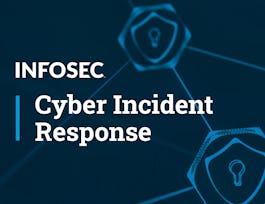This course aims to provide participants with a comprehensive understanding of incident response processes and workflows. The course covers various aspects of automating incident response mechanisms, including centralizing and automating operations, scaling the alert management process, and advanced topics such as correlation, impact assessments, and security use cases showcasing the end-to-end lifecycle of an incident.



(19 reviews)
Skills you'll gain
Details to know

Add to your LinkedIn profile
16 assignments
See how employees at top companies are mastering in-demand skills


Earn a career certificate
Add this credential to your LinkedIn profile, resume, or CV
Share it on social media and in your performance review

There are 4 modules in this course
Module 1 provides a foundational understanding of automated incident response, emphasizing its pivotal role in modern cybersecurity. Participants delve into core incident response concepts, recognizing their significance in contemporary practices. The module elucidates the critical role of automation in security operations and incident response, elucidating the seamless process flow. By the end, learners will grasp the fundamentals, enabling them to appreciate the strategic importance of automation in fortifying cybersecurity defenses and responding effectively to emerging threats.
What's included
9 videos5 readings4 assignments1 discussion prompt
In this module, get familiar with incident management tools and detection techniques. Explore the extensive features and capabilities offered by various tools, which position them as a prominent industry solution. Leveraging Threat Intelligence for Automated Triage, Data Collection, and Advanced Analysis Techniques. Learn how to implement machine learning and AI in incident triage and its basic functionality. Interact with the interface to create playbooks for automated triage and response.
What's included
8 videos3 readings4 assignments1 discussion prompt
Module 3, "Data Collection and Management," immerses participants in essential techniques for ingesting, organizing, and managing incidents. Through understanding of major incidents, learners gain valuable insights, fostering a culture of continuous learning. The module empowers participants to create and curate timelines of activity, facilitating ongoing process improvement. By honing skills in efficient data handling, learners are equipped to navigate incident response with precision, ensuring comprehensive incident understanding, and contributing to the enhancement of organizational cybersecurity protocols.
What's included
9 videos3 readings4 assignments1 discussion prompt
Module 4 introduces learners to the foundational skills of constructing searches, filtering, data transformation, aggregation functions, and result visualization. This knowledge forms a robust foundation for extracting valuable insights and conducting effective data analysis within automation tools. Empowered with these skills, participants are well-equipped to anticipate and adapt to future trends in cybersecurity. The module's focus on data manipulation ensuring that learners not only comprehend the essentials of data analysis but also possess the capabilities to leverage automation tools, fostering their ability to proactively address emerging challenges in the evolving landscape of cybersecurity.
What's included
10 videos3 readings4 assignments1 discussion prompt
Recommended if you're interested in Security

Universidades Anáhuac

Coursera Instructor Network

Google Cloud
Why people choose Coursera for their career




Learner reviews
Showing 3 of 19
19 reviews
- 5 stars
89.47%
- 4 stars
0%
- 3 stars
0%
- 2 stars
0%
- 1 star
10.52%
New to Security? Start here.

Open new doors with Coursera Plus
Unlimited access to 7,000+ world-class courses, hands-on projects, and job-ready certificate programs - all included in your subscription
Advance your career with an online degree
Earn a degree from world-class universities - 100% online
Join over 3,400 global companies that choose Coursera for Business
Upskill your employees to excel in the digital economy
Frequently asked questions
Access to lectures and assignments depends on your type of enrollment. If you take a course in audit mode, you will be able to see most course materials for free. To access graded assignments and to earn a Certificate, you will need to purchase the Certificate experience, during or after your audit. If you don't see the audit option:
The course may not offer an audit option. You can try a Free Trial instead, or apply for Financial Aid.
The course may offer 'Full Course, No Certificate' instead. This option lets you see all course materials, submit required assessments, and get a final grade. This also means that you will not be able to purchase a Certificate experience.
When you purchase a Certificate you get access to all course materials, including graded assignments. Upon completing the course, your electronic Certificate will be added to your Accomplishments page - from there, you can print your Certificate or add it to your LinkedIn profile. If you only want to read and view the course content, you can audit the course for free.
You will be eligible for a full refund until two weeks after your payment date, or (for courses that have just launched) until two weeks after the first session of the course begins, whichever is later. You cannot receive a refund once you’ve earned a Course Certificate, even if you complete the course within the two-week refund period. See our full refund policy.




